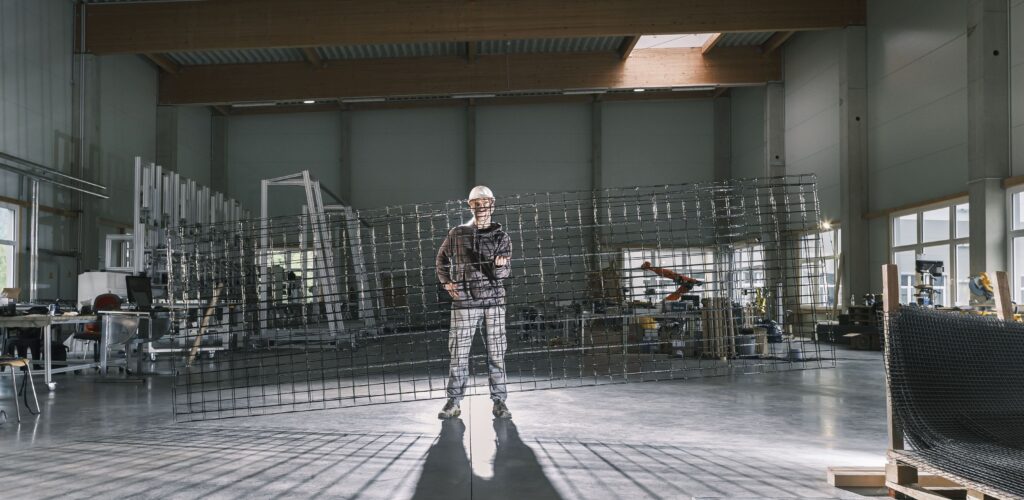Fiber Elements: Building lighter, longer-lasting and low-carbon concrete with basalt fibres


In Europe, construction accounts for some of the highest material use and CO₂ emissions, with concrete and steel at the centre of the challenge. Fiber Elements, an Austrian startup founded in 2023, is proving that the sector can change. By replacing steel reinforcement with basalt fibres and reinventing how these fibres are engineered, the company is cutting carbon, extending durability and reimagining what the future of construction could look like.
Building step by step toward impact
Fiber Elements may be young, but it is already growing fast. With 16 employees and several pilot projects underway, the startup has moved from laboratory research into pre-industrial, serial-scale production. Backed by an EUR 2.6 million seed investment, it is now supplying its first customers: major prefabricated concrete manufacturers in Austria, Germany and Denmark.
Our vision from day one was to leave the lab as quickly as possible and prove the technology in real construction projects. Now we’re at that exciting stage where the first orders are coming in and our reinforcement solutions are making their way into pilot projects.
Wolfgang Fiel, Founder and CEO
Reinventing concrete reinforcement
Traditional concrete relies on steel reinforcement, but steel corrodes. To prevent that, concrete elements are built with thick protective layers of material. This makes components heavy, expensive to transport and carbon-intensive to produce.
Fiber Elements takes a completely different approach. Instead of chopped fibres mixed into concrete, the company uses continuous basalt fibres, arranged into a three-dimensional reinforcement net. The breakthrough lies in the company’s proprietary robotic winding process. Robots pull basalt fibres from a coil and place them precisely where needed, creating a 3D structure optimised for each component’s stress points.
The benefits are striking:
- Up to 70% lower CO₂ emissions, thanks to reduced concrete volumes and corrosion-free fibres
- Double the lifespan of reinforced concrete (up to 100 years, compared to 50 – 60 with steel)
- Lighter, more efficient components that are easier to transport and install

Steel corrodes, basalt doesn’t. That means less concrete is needed for protection, which means lighter components, less carbon and longer-lasting structures.
Wolfgang Fiel, Founder and CEO
Beyond concrete: composites for a low-carbon future
Although its first focus is concrete, Fiber Elements is trying to position itself in the broader composites industry. Its fibres can reinforce a wide range of materials, from low-carbon concretes now under development to raw earth (loam), an ancient building material making a comeback in sustainable architecture.
What ties it all together is the purpose: decarbonisation. We won’t apply our fibres to outdated, high-emission materials. We want to enable the new generation of building materials and make them stronger, lighter and more durable.
Wolfgang Fiel, Founder and CEO
Navigating industry standards
Introducing new materials into construction is never simple. With safety, durability and compliance at stake, industry standards are understandably rigorous. For Fiber Elements, this means a continuous process of testing and validation.
Rather than a barrier, Fiber Elements views regulation as a necessary pathway to scale. Each certification brings its solution one step closer to reshaping how buildings and infrastructure are designed.
Growing within an innovation ecosystem
From its beginnings at the Montanuniversität Leoben startup hub, Fiber Elements has grown within a strong Austrian innovation environment. Early support gave the team access not only to funding but also to a network of academics, researchers and peers.
For Wolfgang, one of the turning points was joining the EIT Manufacturing Venture Building Programme, co-organised with UnternehmerTUM:
Having access to mentors and peers across Europe was invaluable. We could exchange experiences with other founders, refine our storytelling and learn how to present our business in a way that resonates with investors and industry partners.
Wolfgang Fiel, Founder and CEO
The programme offers three months of expert workshops, mentoring, networking events and investor and corporate introductions to support market and investment readiness.
These connections, combined with EU-level funding opportunities, are helping the young startup move from lab-scale ideas to real-world construction sites.
Looking ahead: scaling team and technology
The company plans to double its team by mid-2026, expanding both its engineering capacity and production workforce. Alongside growing its partnerships with prefab manufacturers, Fiber Elements is also pursuing commissioned product developments with industry partners to accelerate adoption.
Our goal is to generate revenue early, not just rely on funding. That sends a strong message to the market: there is real demand for what we do.
Wolfgang Fiel, Founder and CEO
Step by step towards transformation
Fiber Elements is clear-eyed about the road ahead. Certification processes, scale-up challenges and market adoption take time, but every pilot project brings its solution closer to mainstream use.
We don’t see ourselves as changing construction overnight. But with every pilot, every project and every partnership, we are proving that our approach works, and that it can scale.
Wolfgang Fiel, Founder and CEO
With basalt fibres and robotic automation, Fiber Elements is offering the industry a glimpse of a future where concrete is lighter, lasts longer and carries a fraction of today’s carbon footprint.

